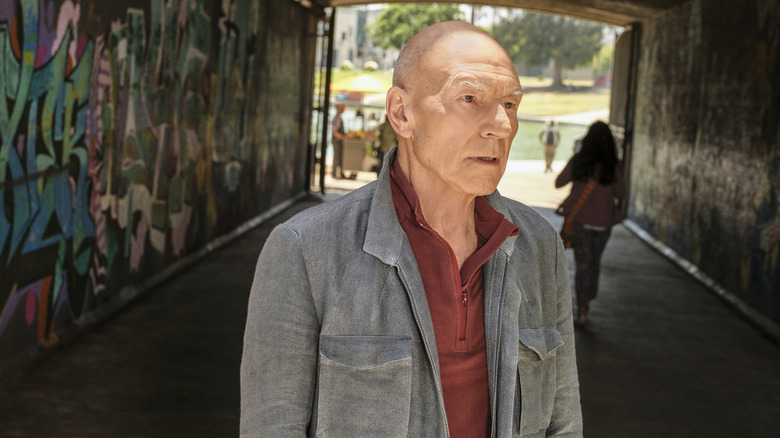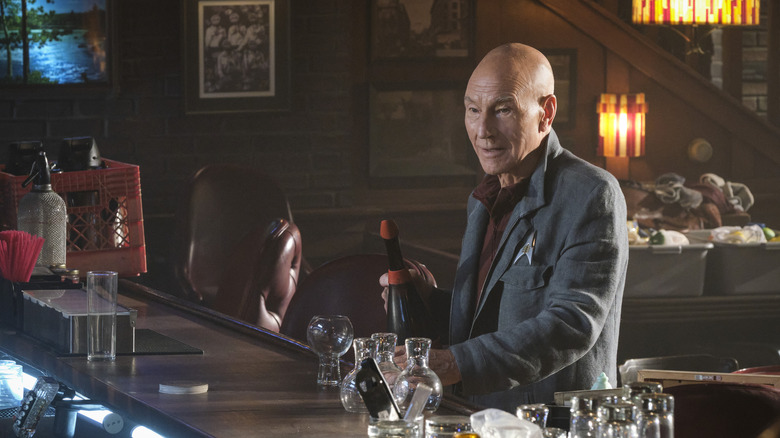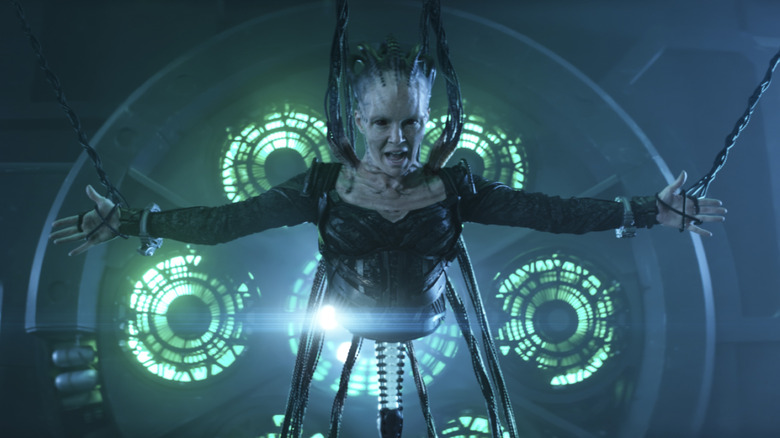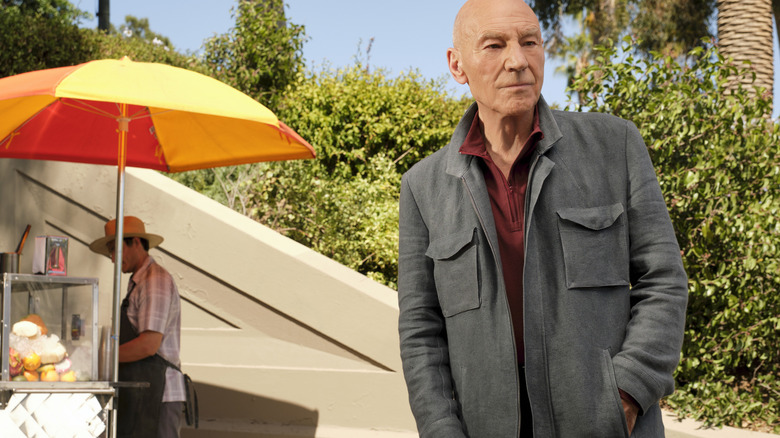The Other Shoe Is Dangling In Episode 4 Of Star Trek: Picard Season 2
Watching the second season of "Star Trek: Picard" has become a fraught experience. Although the first three episodes have been relatively solid in setting up a clear, singular goal for the cast to achieve rather than bog the audience in oblique, senseless mystery, one may still find themselves with jaw still clenched, waiting for the show to drop the other shoe. Surely, a skeptic may posit, "Picard" can't maintain the proper level of engagement and intrigue to keep going. Perhaps there is still time for season two to emerge as bad as season one.
In episode four of "Picard," entitled "Watcher," some iffy ideas are introduced, and there are maybe too many precious Trek references, keeping the audience's awareness high that "Picard" may be teetering on a precipice.
One of those ideas was the re-introduction of Guinan into the story. In "Watcher," Picard (Patrick Stewart) and Dr. Jurati (Alison Pill) — stranded on a crashed ship in the year 2024 — have extracted information from the Borg Queen (Annie Wersching) as to the possible location of a mysterious entity called the Watcher (not to be confused with the similar character from Marvel comics) who may hold to secret as to how the dark Earth seen in episode two may have come into being. Jurati and Picard found a set of Earth coordinates that may lead to a clue, Picard beams to them, and finds himself standing outside 10, Forward Ave., where Guinan worked in the early 25th century. In 2024, a young Guinan seems to have just opened up her bar and is now played by Ito Aghayere. Guinan's young appearance — she has funky dyed hair, cool makeup, and biceps — counters what we saw of her in the "Star Trek: The Next Generation" episode "Time's Arrow," wherein an already-Whoopi Goldberg Guinan was tooling around with Mark Twain in 1893.
It was established in the NextGen episode "Yesterday's Enterprise" that Guinan also had an extrasensory instinct allowing her to vaguely intuit when timelines shifted and something was rotten in the state of Denmark, er, the space-time continuum. In "Watcher," that instinct manifested itself as seasickness, and Guinan nearly doubled over when Picard repeated a few choice words from a conversation they had earlier in the show. I think I preferred when Guinan merely perked up, confused that things had eerily changed. The role Young Guinan will play in the rest of the season has yet to be revealed.
Watch out for butterflies
Causality has often been a concern in "Star Trek" time travel stories, and many "Star Trek" characters — when they do find themselves in the past — are incredibly careful not to taint the timeline and accidentally rewrite history. Indeed, as established in the "Deep Space Nine," there exists a Temporal Integrity Commission, put in place to make sure all of the time travel isn't causing strange attractors.
In "Watcher," the characters have abandoned all sense of propriety when discussing timelines, and quickly toss out a "watch out for butterflies!" when expressing concern about continuum tainting. It shouldn't need repeating, but "Picard" and most of the Paramount+ Treks have eschewed "Star Trek's" usual sense of order and procedure in favor of action and melodrama. While I appreciate that the characters are cognizant of timeline purity, I would have appreciated more formal language.
The threats to the timeline come mostly from Raffi (Michelle Hurd) and Seven (Jeri Ryan) attempting to track down Capt. Rios (Santiago Cabrera), who was arrested and detained by ICE in the previous episode (An appreciated detail: Because the communication infrastructure that allows their communicators to work hadn't yet been built in 2024, the characters aren't in constant communication, and their transporters don't work well. They have to rely on their wits to survive. This makes for better storytelling). In order to find Rios, Raffi and Seven have to break into a police car and hack the police computers, leading to a police car chase wherein Seven has to teach herself to drive on the fly. It goes only slightly more smoothly than you'd expect.
A reference some may appreciate is when Seven and Raffi must ride a bus, and encounter an aging punk rocker playing the song "I Hate You" by the band Edge of Etiquette. This mirrors the scene in "Star Trek IV: The Voyage Home" when Kirk and Spock heard the same song in 1986. In both "Voyage Home" and "Picard," the Punker on the bus is played by "Star Trek" associate producer Kirk R. Thatcher, who also wrote the song. This time around, the punker is far more polite when asked to turn down his music, likely remembering being pinched into unconsciousness 36 years earlier.
Parallel mothers
In the last episode, "Assimilation," Dr. Jurati allowed her brain to be partially assimilated in order to extract information from the Borg Queen. In "Watcher," we see their mental link has kickstarted a dark rapport between them. Jurati seems legitimately tantalized by the notion of joining the Borg collective, and the Queen now seems to have more of a negotiating chip to deal with. The two are forming an uneasy respect for one another, which enriches the characters and makes the drama all the more compelling. This was a good narrative choice.
Meanwhile, Picard is having mother drama of his own, and "Watcher" treats audiences to additional flashbacks to Picard's early youth on his château, giving more scenes to his mother, previously seen in the first episode. The La Sirena had previously crash-landed right next to Château Picard, and currently hides out there under a cloak. Picard and Jurati plunder the wine cellar, finding bottles of pinot to drink. Picard reveals that his childhood home had been abandoned during WWII, and would not be re-opened for a century hence. These details are mere fun pieces of worldbuilding, I suppose, but a show like "Picard" doesn't seem to be walking us through Picard's past for character or thematic reasons, and one might get the sinking feeling that Picard's mother will return to play an active part in the show's central plot. If this is the plan, it is extremely stupid. Some fans have posited that the faceless, tentacled Borg monster from episode 1 is indeed Picard's mother, which sounds just dumb enough to be possible.
Don't worry. The Watcher is not Picard's mother.
Girl Watcher
"Watcher" concludes with two mysterious twists. Thanks to Young Guinan, Picard is led to the location of the Watcher, which happens to be in a nearby Los Angeles park. The Watcher first manifests in the body of a human emissary, a young girl with all-white eyes. The Watcher can psychically "leap" from body to body, leading Picard a mere 30 feet from where he was sitting where he will face the Watcher herself. The intermediaries are extraneous and add nothing to the plot other than to extend the scene's length. I simply found myself wanting to re-watch the 1998 thriller "Fallen," a film about a fallen angel who had the same superpower. The twist is that the Watcher is none other than Laris (Orla Brady), Picard's Romulan housemaid, only without her Romulan eyebrows or ears. I certainly hope in the following episode the explanation as to her presence in 2024 is interesting; this has potential to ... well, the shoe is dangling.
The other twist comes in an epilogue wherein Q (John de Lancie) reappears to recite a portion of a pulp detective novel. When he snaps his fingers, nothing happens. Shock and alarm! Q has either become human, or is losing his godlike powers, a premise repeated from the "Next Generation" episode "Déjà Q."
"Picard" is not lost, but it's wandering into the weeds, and audiences may be holding their breath still. One can hope they will be able to exhale next week.



